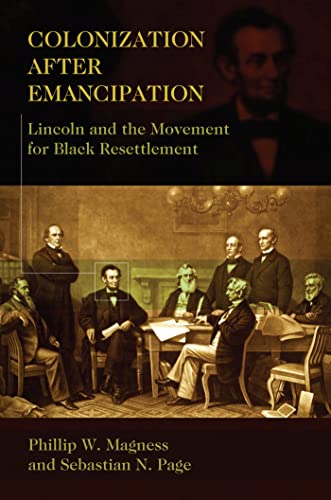Colonization After Emancipation
Lincoln and the Movement for Black Resettlement
Phillip W. Magness; Sebastian N. Page
BOOK REVIEW

Colonization After Emancipation: Lincoln and the Movement for Black Resettlement emerges as a striking examination that reveals the unsettling complexities of American history following the Civil War. Written by the insightful duo, Phillip W. Magness and Sebastian N. Page, this work delves into the audacious, yet controversial, efforts to resettle formerly enslaved African Americans, shedding light on a chapter of history that is often overshadowed by the fight for civil rights.
Why is this book crucial? Because it navigates through the murky waters of ideals and realities that plagued the post-emancipation landscape. The authors transport you into the mind of Abraham Lincoln, whose vision for America included radical notions of colonization as a solution for freed Black individuals. The profound ambiguity of his intentions raises a crucial question: Were these proposals a genuine attempt to provide Black communities with opportunities, or merely an extension of the racial prejudices that had defined America?
The narratives presented in this research are exhumed from a historical amnesia that grips our understanding of Lincoln's presidency. Many readers may come to the book with reverence for Lincoln, the Great Emancipator - but Magness and Page force you to reconsider this image. The authors unveil the political pragmatism behind colonization, illustrating how figures like Lincoln thought of emancipation not just as a moral mandate but as a logistical puzzle. Entering this intellectual arena, you will undoubtedly face emotions of disbelief and introspection as you confront the moral and ethical implications behind the colonization movement.
As you read, the voices of the people caught in this political theater echo throughout the pages. Formerly enslaved Africans were not mere subjects of colonial propaganda-they were individuals with desires, dreams, and a shared history that could not simply be erased. Their testimonies, interspersed within the narrative, offer a searing examination of resistance and resilience. You'll feel the weight of their struggle and the urgency of their fight for autonomy in a nation hesitant to fully accept their rightful place.
The commentary around Colonization After Emancipation has sparked vigorous debate within academic and public spheres alike. Critics argue that the authors lean too heavily on historical interpretations that absolve Lincoln of responsibility. Proponents, however, celebrate the work for its willingness to challenge long-standing narratives while providing previously overlooked context that enriches our understanding of this crucial period. It's a literary battleground where perspectives clash, and you can almost see the shapes of history unfold before your eyes.
The emotional rollercoaster experienced while reading this book is not purely a cerebral exercise; it's a visceral encounter with the past that compels you to reflect on our current societal structures. How much have we learned? Are we repeating the colonial mistakes of yesteryear in modern forms? These questions aren't just academic-they resonate deeply in today's ongoing dialogues about race and equity.
In conclusion, Colonization After Emancipation: Lincoln and the Movement for Black Resettlement is not merely a historical analysis. It's a powerful call to recognize the multifaceted legacy of America's approach to race and identity. This book dares you to confront uncomfortable truths while providing a platform for marginalized voices in history. By engaging with the text, you're not just reading history; you're becoming part of an urgent conversation about who we are and who we aspire to be as a nation. Buckle up, because this book is more than just a read; it's an awakening.
📖 Colonization After Emancipation: Lincoln and the Movement for Black Resettlement
✍ by Phillip W. Magness; Sebastian N. Page
🧾 178 pages
2018
#colonization #after #emancipation #lincoln #movement #black #resettlement #phillip #magness #PhillipWMagness #sebastian #page #SebastianNPage